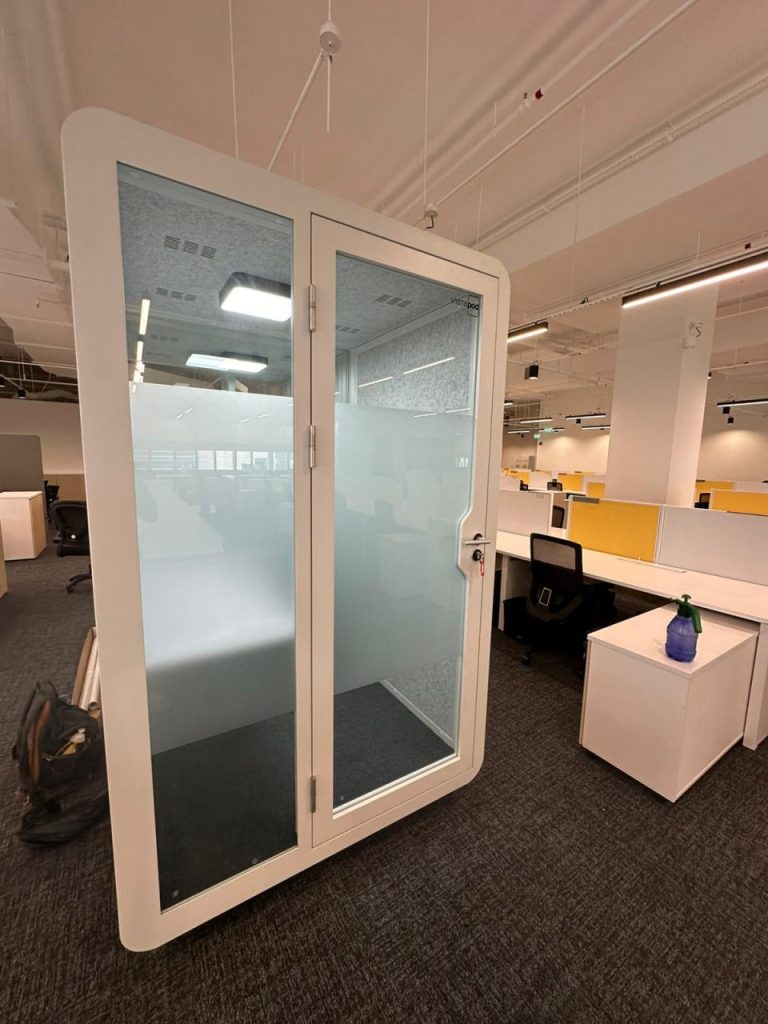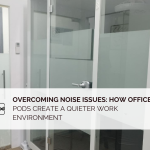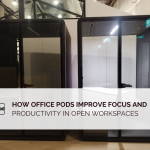No pods added to your quote request yet. Add some now for a free quote!
The Science Behind Office Pods: Improving Cognitive Function at Work

In today’s fast-paced work environment, maintaining high levels of cognitive function is crucial for productivity and overall well-being. As open-plan offices have become the norm, the demand for private spaces within these environments has surged. Enter the office pod—a self-contained, soundproofed space designed to foster concentration, creativity, and cognitive rejuvenation. But how exactly do office pods improve cognitive function at work? The answer lies in a combination of psychology, neuroscience, and environmental design.
The Cognitive Demands of Modern Workspaces
Open-plan offices, while fostering collaboration, often compromise on the ability to focus. The constant barrage of noise, visual distractions, and interruptions can lead to cognitive overload, where the brain struggles to process the influx of information. Studies have shown that continuous exposure to such environments can lead to decreased productivity, higher stress levels, and mental fatigue. This is where the concept of “cognitive ergonomics” comes into play—a field that examines how workspaces can be designed to support the mental processes required for work.
The Role of Office Pods in Enhancing Cognitive Function
Office pods are designed to address the shortcomings of open-plan offices by providing a quiet, distraction-free environment. Here’s how they help improve cognitive function:
- Noise Reduction: Noise is one of the most significant stressors in open-plan offices. Research shows that noise exposure can impair cognitive performance, particularly in tasks requiring complex thinking or problem-solving. Office pods are typically soundproof, reducing ambient noise levels and allowing employees to concentrate on their work without interruptions.
- Controlled Environment: Office pods offer a controlled environment where factors such as lighting, temperature, and even air quality can be optimized. Poor lighting and uncomfortable temperatures are known to impair cognitive performance. By customizing these elements, office pods create an environment that supports mental clarity and focus.
- Visual Privacy: Visual distractions are another common challenge in open-plan offices. The movement of people, flashing screens, and other visual stimuli can be highly distracting. Office pods provide visual privacy, allowing employees to immerse themselves in their work without the constant pull of external stimuli.
- Psychological Safety: Office pods offer a sense of psychological safety—a space where employees can retreat from the pressures of the office environment. This sense of safety is crucial for creativity and deep work, as it allows the brain to enter a state of flow, where cognitive performance is at its peak.
- Reduction of Decision Fatigue: Decision fatigue occurs when the brain is overwhelmed by the sheer number of choices it has to make. In an open office, employees are constantly bombarded with decisions, such as where to sit, how to manage interruptions, and how to deal with noise. By providing a dedicated space, office pods reduce the cognitive load associated with these decisions, allowing employees to focus their mental energy on more critical tasks.
The Neuroscience of Quiet Spaces
The benefits of office pods are not just anecdotal; they are backed by neuroscience. Studies have shown that the brain’s prefrontal cortex—the area responsible for decision-making, attention, and problem-solving—functions optimally in quiet environments. When the brain is not constantly switching between tasks or dealing with distractions, it can engage in deeper cognitive processing, leading to better problem-solving and creativity.
Moreover, quiet environments have been found to increase the production of alpha waves in the brain. Alpha waves are associated with a state of relaxed alertness, where the brain is calm yet focused. This state is ideal for tasks that require deep thinking, such as strategic planning or creative brainstorming.
Office Pods and Mental Health
Beyond cognitive function, office pods also play a role in supporting mental health. The constant noise and distractions in open offices can lead to chronic stress, which in turn affects cognitive function. By providing a space where employees can take a break from the hustle and bustle of the office, pods help reduce stress levels. This is particularly important in today’s work culture, where burnout and mental health issues are on the rise.
Office pods also offer a space for employees to engage in mindfulness practices, such as meditation or deep breathing exercises. These practices are known to improve cognitive function by reducing stress and promoting mental clarity.
Conclusion
In the quest for productivity and well-being, office pods offer a scientifically-backed solution to the cognitive challenges posed by modern work environments. By reducing noise, providing visual privacy, and creating a controlled environment, these pods enhance cognitive function, support mental health, and ultimately contribute to a more focused and productive workforce. As the science behind cognitive ergonomics continues to evolve, office pods are likely to become an integral part of the future workplace, offering employees the sanctuary they need to thrive in an increasingly demanding world.
Check these out too!
-
The Role of Meeting Pods in Agile Work Environments: Flexibility and AdaptabilitySeptember 26, 2024/0 Comments
-
How Office Pods Improve Focus and Productivity in Open WorkspacesSeptember 16, 2024/
-




